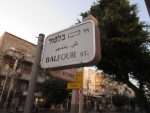This year marks the 100th anniversary of the Balfour Declaration, a cause for commemoration and even celebration on the part of Jewish activists worldwide.
The Balfour Declaration refers to a short letter from Lord (Arthur) Balfour, former U.K. prime minister and then-foreign secretary, to Lord (Lionel Walter) Rothschild. In it, Balfour declared that the British cabinet had approved a statement that the government favoured the establishment of a Jewish national home in what was soon to become the British Mandate of Palestine.
The implications of the declaration have been debated by pro- and anti-Israel activists for, well, an entire century. For many in the pro-Israel community, the declaration is akin to a Magna Carta for the Zionist movement: an affirmation – from the very authority that would oversee the territory – that Zionism was indeed a worthy enterprise.
Without diminishing this sentiment, I offer my interpretation of the Balfour Declaration and what it teaches us about pro-Israel advocacy today.
The Balfour Declaration was a strategically vital recognition of the right of the Jewish people to self-determination – and one that clearly affected the course of history. But Balfour did not establish our national rights, which pre-existed the declaration. These rights have always been rooted in the natural right of every nation to shape its own identity and achieve self-determination in its ancestral land.
This is not a minor distinction. We dare not confuse the validation of our rights with the source of our rights. Indeed, our detractors falsely do so. In their minds, if the Balfour Declaration can be dismissed as a “colonial” statement, the rights of the Jewish people to which it speaks can be similarly undermined.
It’s this sort of nonsense that suggests Jewish history in the land began in 1917. To believe it, one would have to ignore the mountains – and caverns – of archeological and historical evidence that confirm a Jewish presence in the land for millennia. In addition to various non-biblical documents confirming Jewish indigenous roots in Israel, the Bible itself is widely recognized – even by ardent atheists – as a historical chronicle of a particular people in a particular land.
As Shimon Koffler Fogel, chief executive office of the Centre for Israel and Jewish Affairs (CIJA), recently observed, the Balfour Declaration was “one milestone among many that confirm the moral, historic and legal right of the Jewish people to self-determination in our ancestral land. Just as many states endorsed the Balfour Declaration at the time, the international community’s support for the national liberation of the Jewish people after centuries of exile has been expressed time and again.”
Fogel further noted that, in a similar vein, November also marks “the 70th anniversary of the UN partition resolution of 1947, which expressly called for the creation of a Jewish state.”
The Balfour Declaration matters today precisely because it is more important than ever that we show how our fundamental rights as a people are backed by international consensus. The declaration is not the linchpin of this recognition but rather a signpost on the road to achieving widespread affirmation of our rights.
Every year, CIJA brings approximately 200 Canadian leaders and future leaders (almost all of whom are non-Jewish) on fact-finding missions to Israel. As someone who heads an annual trip of post-grad students, I can tell you that most Canadians – including those sympathetic to Israel – are not particularly interested in what a British lord had to say about the region a century ago.
But what they do care about, and what makes them more receptive to understanding the strong legal and moral foundation for Israel’s existence, is that many global figures and organizations (including the United Nations) have echoed these rights. In this regard, Balfour is an important thread of the historic fabric.
The importance of non-Jewish validators applies to many pro-Israel advocacy issues, such as Israel’s right to define itself as a Jewish homeland, the dangers of BDS (the movement to boycott, divestment from and sanction Israel) or the threat posed by Israel’s neighbours. On these and other topics, our target audience is generally more receptive to our perspective when we can demonstrate that it is one shared by others, including governments and leaders around the world.
Balfour matters, but we should remember why. The declaration serves not as the basis for modern Israel’s existence but as a key witness to the abundant evidence – irrefutable, millennia-old proof – of the right of the Jewish people to self-determination.
Steve McDonald is deputy director, communications and public affairs, at the Centre for Israel and Jewish Affairs. Follow him on Twitter at twitter.com/koshermcdonald.


